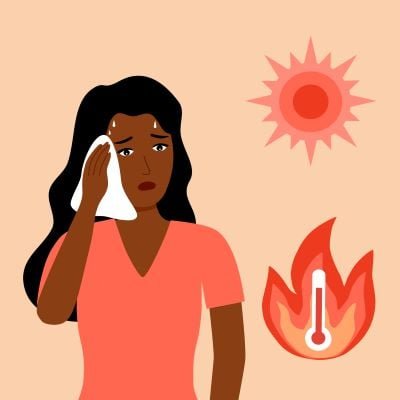Heat and Mental Health | Anxiety and Depression Association of America, ADAA

As we are experiencing heat domes across the planet, there is emerging evidence from recent publications (1) that heat, among effects on many other human activities, can also have profound effects on mental health.
Here are some signs that the heat might be affecting your mental health:
- Changes in Mood: You might feel more irritable, anxious, or depressed than usual. Some people might also experience mood swings or feel more aggressive.
- Difficulty Concentrating: Heat can make it harder to focus or think clearly. You might find it difficult to complete tasks that usually aren’t a problem for you.
- Trouble Sleeping: High temperatures, especially at night, can disrupt your sleep. Lack of sleep can make you feel tired, grumpy, and can worsen mental health conditions like anxiety and depression.
- Feeling Overwhelmed or Stressed: If you’re feeling unusually stressed or overwhelmed, it could be due to the heat. This can be especially true if you’re worried about the heat itself, or if it’s making other problems in your life feel worse.
- Physical Symptoms: Heat can also cause physical symptoms that affect your mental health. For example, you might feel more tired than usual, have headaches, or feel dizzy or nauseous. These physical symptoms can make you feel anxious or down.
- Changes in Behavior: You might find yourself acting differently when it’s hot. For example, you might be more impulsive, or you might have a hard time controlling your anger.
Worsening of Existing Mental Health Conditions: If you already have a mental health condition like depression, anxiety, bipolar disorder, or schizophrenia, you might notice that your symptoms get worse when it’s hot.
The effects of heat may even include thinking about suicide.
- Hot Weather and Suicide: The studies found that when the temperature goes up, sadly, so do suicide rates. This seems to be especially true for men and older people. This means that when we’re trying to prevent suicide, we should think about how hot weather might be making things worse.
- Heatwaves and Hospital Visits: When it’s hot outside, people who already have mental health problems might feel even worse, and they might need to go to the hospital more often. This means that hospitals and clinics need to be ready for more patients when there’s a heatwave.
- Climate Change and Mental Health: Climate change is making hot days and heatwaves more common. The studies suggest that as the weather gets hotter because of climate change, we might see more mental health problems and suicides. One study even predicted that if we don’t do anything about climate change, there could be thousands more suicides in the US and Mexico by the year 2050.
- Hot Weather and Medication: Some people take medication to help with their mental health problems. But when it’s hot outside, these medications might not work as well, or they might have more side effects. Doctors need to keep this in mind when they’re helping patients during hot weather.
What This Means for Public Health: These studies show that we need to think about hot weather and climate change when we’re making plans to keep people healthy. This might mean coming up with new ways to prevent suicide that take hot weather into account or making sure that hospitals are ready for more patients during a heatwave.
What We Still Don’t Know: Even though these studies tell us a lot, there’s still a lot we don’t know. We need more research to understand how hot weather affects different types of mental health problems, what the “danger zone” temperature might be for mental health, and how being inside vs. outside might make a difference. In conclusion, these studies show that hot weather and climate change can make mental health problems worse. This is a big deal, and it’s something that doctors, hospitals, and people who make health policies need to pay attention to. We also need more research to help us understand and deal with this problem better.
If you find that heat is making your mental health symptoms worse, there are several strategies you can use to help manage your symptoms and stay comfortable:
- Stay Hydrated: Dehydration can worsen feelings of anxiety and irritability. Make sure to drink plenty of water throughout the day, especially if you’re sweating a lot.
- Stay Cool: Try to spend time in air-conditioned places if possible. If you don’t have air conditioning at home, consider visiting a public place that does, like a library or shopping mall. You can also use fans, take cool showers, or use cold packs to help cool down.
- Avoid the Hottest Part of the Day: If possible, try to stay indoors during the hottest part of the day, usually between 10 a.m. and 4 p.m. If you need to be outside, try to stay in the shade.
- Wear Appropriate Clothing: Wear lightweight, loose-fitting clothing to help stay cool. Light-colored clothing can also help reflect the sun’s rays.
- Take Care of Your Physical Health: Make sure to eat balanced meals and get plenty of sleep. Both can help manage mental health symptoms.
- Practice Stress Management Techniques: Techniques such as deep breathing, meditation, and yoga can help manage feelings of stress and anxiety.
- Reach Out to Others: If you’re feeling down or anxious, don’t hesitate to reach out to friends, family, or a mental health professional. They can provide support and help you find ways to manage your symptoms.
- Follow Your Treatment Plan: If you have a mental health condition and are under the care of a healthcare provider, continue to follow your treatment plan. If your symptoms are getting worse, contact your healthcare provider. They may be able to adjust your treatment plan to help manage your symptoms during periods of extreme heat.
References:
Source link
#Heat #Mental #Health #Anxiety #Depression #Association #America #ADAA

